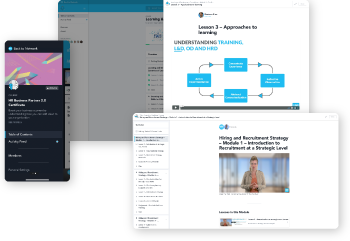用Eventbrite的CHRO人性化HR
欢迎来到另一集激动人心的人力资源知识!这是为人力资源专业人士和商业领袖准备的播客和视频系列,他们希望自己的组织能够经得起未来的挑战,并了解行业专家、chro和思想领袖的最新趋势和见解。
你如何才能释放员工的全部潜力并改善他们的心理健康?在这期节目中,我们欢迎Eventbrite首席人力资源官David Hanrahan,深入探讨员工福利以及信任、灵活性和选择的概念。
David是一位资深的人力资源领导者,擅长在快节奏的环境中建立强大的人力资源团队和创新的人才实践。他是一个有创造力的梦想家和一个专注的执行者!
在这集《人力资源的一切》中,我们将讨论:
- 信任是一种绩效指标
- 了解员工的动机,释放他们的全部潜力
- 建设以员工为中心的组织
观看完整的面试,找出如何建立一个高效的工作场所,释放你的全部潜力。
相关(免费)资源!继续往下读↓
51人力资源指标备忘单
数据驱动的人力资源从实施相关的人力资源指标开始。下载51个人力资源指标的免费小抄
记录:
大卫•汉拉罕:这就是衡量我所说的信任类型有点棘手的地方,因为你不能只说“是”或“否”,我信任我的老板。然后就可以了,很好。我们对团队有90%的信任,因为我们彼此信任,我认为这很有趣。一个有趣的概念是如何获得信任?如何建立信任?所以说,如何衡量它是一回事?但是你是如何构建它的呢?信任的输入是什么?
尼Verlinden:大家好,欢迎来到这集人力资源知识。我叫尼莉,是你们的主持人。在今天的节目中,我和Eventbrite的首席人力资源官David Hanrahan进行了交谈。我们的谈话都是关于员工福利的,我们探讨了信任、灵活性和选择的概念。我们放大了Eventbrite在涉及到人们的心理健康时所采取的一些举措。我认为有足够的理由去看看这一集,现在就去看看。但在此之前,不要忘记,一如既往,订阅我们的频道。按下提醒铃,喜欢这集。非常感谢,祝大家收看愉快。
尼Verlinden:大家好,欢迎收看全新一期的人力资源知识。我叫尼莉。我还是你们的主持人,今天和我一起的是大卫·汉拉汉。他是Eventbrite的首席营销官。嗨,大卫。你好吗?
大卫•汉拉罕:嗨,尼。我很好。很高兴来到这里。
尼Verlinden:我很高兴你能来,大卫。我看到你们有一个全额奖励的空缺职位。我可以在哪里申请?
大卫•汉拉罕:对,eventbrite.com和我们的职业页面。我现在到处都在找候选人。我很高兴能在我刚刚开启的搜索中认识很多人。
尼Verlinden:是的,我看到了。所以对于所有正在收听的人。如果你对此感到好奇,一定要看看大卫的和领英,因为他发布了我在一段时间内见过的最可爱、最有趣的广告之一。所以一定要去看看。大卫现在回到你身边了。简单地说,你作为公司的CHRO管理BriteLand体验团队。你如何描述英伦乐园的经历?
大卫•汉拉罕:在英国的经历是一种经历我们是一个充满同情心的文化,围绕着一个重要的使命。所以这就是我们对Brite的希望,当他们加入时,他们将得到一种充满同情心的文化,围绕着一项重要的使命。这个使命就是通过真实的体验让世界重新团结起来。我认为,在过去的18个月左右,由于一场大流行,我们很多人都感到与我们的人类同胞脱节。我们希望能解决这个问题。
尼Verlinden:是的,我认为这非常正确。我想在过去的18个月里,我们中的很多人确实感到与我们的人类同胞脱节了。大卫,我认为在我们今天的谈话中,我们也会涉及到这一点,因为我真正想和你谈的一件事是建立一个可以释放人们全部潜力的工作场所。我认为这是今天对话的一个很好的主题。这让我回到了大流行,希望它的后果,如果我们已经可以这样称呼它,许多组织都在重新思考他们创造的工作场所。和你们一起,我想重新构想工作场所,使公司能够,如我所说,充分释放员工的潜力。现在,你会怎么说?这样的工作场所有基础吗?
大卫•汉拉罕:我想的是释放人们的潜能。你得明白他们的动机是什么。所以我认为很多公司都熟悉了解员工敬业度,做敬业度调查,这些都是典型的,固定的问题,被确定为与敬业度有某种联系,或者我们会看到,你知道,通过团队,地点和水平,员工敬业度是什么,通过不同的因素,然而,激励个人的是什么是非常有趣的,这是非常不同的。什么能激励我,什么能激励你。这些是非常不同的。它们非常微妙。我不认为组织在理解员工个人动机方面做得很好。有高度积极性的员工是高绩效的员工。当你真正有动力的时候,你就能找到最关心你的东西和你最关心的东西。这是释放你潜力的关键,也是理解你所关心的激励因素的关键。 And I don’t think there are really great tools out there on this, and you know, I think this is probably the key or the foundation for a workplace that unlocks your potential.
尼Verlinden:这实际上是要找出每个人的个人动机。
大卫•汉拉罕:对,对,我也是这么想的。因为当你挖掘你的动力所在时,你的动力就会改变,你在挖掘你的潜力。我认为当你了解了自己的动机,你就能明白,你想在你的职业生涯中走向哪里。再一次;这关乎你的潜力。企业往往在激发你的动机方面做得不好,企业往往会扼杀你的动机。所以你进来的时候充满了热情,你知道,在你加入的新公司里,你对这份新工作很兴奋。现在,随着时间的推移,这种兴奋感会因为各种原因而减弱,你换了一个新经理,你开始做一些你真的不喜欢做的事情,你的动机会被组织扼杀。因此,如果组织能够更好地理解你的动机是什么并将这些动机与工作结合起来,对吧,因为不仅要理解你的动机,还要将其与工作结合起来,我们如何将你的动机应用到工作中呢?如果我们这样做了我们认为这是我们在工作场所挖掘你的潜力的关键? I think there could be really great things that come from that, but I don’t think most organizations think that way.
尼Verlinden:大卫,我要坚持这个想法,我马上就会回到这个问题上。我想先问你一件事,因为当我们谈到。这是我们的个人动机,我可以这么说,是什么让我们早上起来。例如,它确实暗示了,我们知道这是什么,对吧?我认为很多人不一定意识到个人动机是什么。你对此有什么看法?

大卫•汉拉罕:这是真的吗?是的。我的意思是,你多久会真正深入地思考一下是什么激励着你?与五年前相比,你现在的动力是什么?很久以前,我的一位前任老板向我介绍了一个工具,我认为这个工具非常酷,叫做动机饼图。我们已经在Eventbrite申请了。但这是一种反思练习,你知道,你坐下来,想象一个饼,就像一个圆。你知道,如果你说,今天是什么激励着你,你有很多你想要应用的百分比。你可以说,40%,创造力,10%,金钱,你知道,X %与老板的关系,你可以说,我的家人,是我最大的动力。但是,你知道,红色,黄色,绿色,这个激励因素今天表现如何? So you could say, 40% of what really drives me is being creative. And it’s read, I don’t feel like the work I’m doing today is creative. I don’t feel like I’m not able to, you know, scratch that itch I have on being creative. And so this can be a reflective exercise, like, hmm, wow, this is a problem. 40% of what motivates me is creativity. And I’m not, I’m not getting that met, then you talk to your boss about it like, Well, why is that? How can we move that from red to yellow? Is there just something fundamentally broken between the job and the company that you’re in right now? What do you care about? And sometimes when you’re doing that, you have to really reflect on what Yeah, what would creativity mean, for me, like, what would I be doing? Does that mean I want to go to film school, does that mean I want to just be more creative at work, and it’s in the conversation with your boss that you better understand for yourself, but then your boss better understands it. And I think every time I’ve done this type of exercise, it’s been really eye-opening for me because all my direct reports are very different. And even for myself, it’s changed. It’s changed when I have a, you know, I have two kids now. And what motivated me before I had two kids is very different, even at work. So I think you have to continue to look at this. And engagement surveys don’t really do this, they don’t really do what I’m talking about, because this is an individual exercise with your boss that I think is really important.
尼Verlinden:绝对的。大卫,我相信你在不同的帖子中也提到了一些元素,有选择,有信任,有灵活性。这三个元素都很重要,我真的很想放大这些元素,和你们一起探索,从选择元素开始。现在,你是怎么做到的呢?
大卫•汉拉罕:作为一个组织,我们组织了一个培训,在大流行期间,我们意识到,你知道,领导力现在比以往任何时候都重要,我们在大流行之前就已经知道这一点,但当然,在大流行期间,当人们,你知道,害怕,世界上有很多,你知道,冲突,事情正在发生变化。我们知道,作为一家公司,领导力将是我们如何度过整个大流行的真正核心。所以我们推出了一个领导力项目,叫做“引领胜利”。它有九条领导原则。在这些原则中,真正内在的是在了解你的团队之前先了解你自己。当你了解了你自己,这也是关于你的激励因素,作为一个个体,作为一个领导者,比如什么能激励你,你关心什么,你相信什么,最后我们会谈到了解你的团队。理解你的团队包括一个概念,我们称之为从同理心开始建立信任,这是一种包含在脆弱性概念中的概念。你要了解你所关心的和激励你的是什么,然后还要了解你的团队。所以灵活性和选择,我认为,都包含在同理心的概念中。所以,你知道,如果我们在谈论如何建立一个组织,以正确的方式平衡选择,以正确的方式平衡灵活性,核心是了解你的员工,了解你的员工队伍,关心他们,有同理心。 And so we actually trained for that. We have a leadership principle called, start with empathy, building trust, and so trying to operationalize empathy in a way, and I think when you do that, then you start to understand how to balance choice and flexibility with getting the job done, right? Because the radical flexibility of just doing whatever you want, there are no rules is obviously not a good way to go. You have to have some balance of flexibility and a balance of like, here’s some guideposts here’s some generally how we like to get stuff done, here are some operational patterns at the company that we find helpful. And so that that’s inherent in the look in the training that we built on that all our managers have gone through.
尼Verlinden:大卫,那在现实中是什么样子的呢,因为你说你实际上在这方面进行培训,我认为这非常有趣。那么,是不是每个经理都可以尝试用自己的团队来平衡呢?或者你会给出一些最佳实践吗?或者你在Eventbrite是怎么做的?
大卫•汉拉罕:我想如果你缩小视野,我们是一家软件公司。所以一般来说,我们可以异步操作。这对其他行业来说可能不是真的。也许我们稍后会讲到。但我们的运作方式是,我们只需要振作起来。所以你如何完成你的工作,你是否完成你的工作从一个木屋,海滩上的编码开发代码,我们有时间,我们还没有最后期限,我们需要,但你怎么做它,我是否要做这个周末,是否我要做这个,你知道,从山顶,是否我今天要花两个小时做,,我要把整个休息一天,我们并不关心现在这和制造环境有很大的不同。所以对我们来说,我们试图打破传统做事方式的观念。所以对我们来说,这实际上是:不要担心从周一到周五,朝九晚五的传统工作方式,你知道,就像你的午餐休息时间,那只是你必须打破它,在混合设置中异步操作只是一个非常不同的现实。所以在大流行之前97%的员工都在办公室工作。 We’re very in office culture, we’re very nine to five, you know, FaceTime type of culture. And so when the pandemic hit, we just like many companies realize we don’t need to operate that way anymore. We can start to rethink everything, and rethink all our sort of legacy beliefs about how you manage and how you work. And a lot of the core that is now operating asynchronously, we got to hit our deadlines, but how you do it is up to you. And so how you manage and how you lead in that setting is very different. Leading with high trust and leading with belief and understanding your team is your path to high performance more so than I’m going to command and control and I’m going to give you deadlines, I’m going to micromanage you. So that’s kind of what it’s about.
尼Verlinden:是的,谢谢,大卫,我真的想马上继续你说的关于信任和高度信任的领导是高绩效的途径。我真的很喜欢这一点,我在你的一篇文章中也看到了你在解释为什么信任如此重要。现在。我可以想象有些人听到这个会想,好吧,这有什么新鲜的吗?因为每个人都知道信任很重要。为什么你仍然觉得有必要用一篇文章来阐述信任的重要性?让我们从这个开始。
大卫•汉拉罕:我认为对于我们中的许多人来说,在大流行期间,我们已经被错误的信息淹没了。所以工作中存在错误信息,所以我们不能你知道,我们不能免疫一旦你打开笔记本电脑开始工作,我们就生活在一个错误信息的时代,在公司环境中,对领导人物的信任也在减少。我们侵蚀了人们对机构的信任。所以我认为,很多人醒来后看了新闻,然后打开笔记本电脑开始工作,他们在质疑一切,所以信任不再是与生俱来的。我天生就不信任我的领导。我并不相信我的组织。我天生就不相信他们告诉我的。所以你必须赢得信任,但我认为我们很多人在公司环境中假设信任是给定的,就像你说的,当然,是的,信任。你知道,信任很重要,但我认为我们忽视的是信任正在被侵蚀,我相信作为领导者,你应该假设信任并不存在,你应该假设建立一个高度信任的工作场所是非常困难的。但是想象一下一个团队是一个本质上相互信任的团队,对吧? So just think of that team that you’ve been in that where we just like, we just trust each other. What is present, when you trust your team, and you trust your boss, you almost have this innate sort of ability to relate and understand what they’re going to think in a certain moment, what my boss would say, I can come to my boss, right? I have psychological safety, I can come to my boss and like to criticize, I can say, Hey, I didn’t think that was a good approach. You know, I didn’t think what you did there made any sense. And so then information flows much more quickly, you operate more quickly. You have feedback, you learn, you grow. So tapping into human potential, can’t do that without high trust. Because if I don’t trust, I’m not going to give you feedback, I’m not going to tell you what you need to know, I’m going to hold that back. And so I think that’s been true for a lot of society in the pandemic, that trust is eroded. But I think that’s probably true in the workplace, too. I don’t think we should assume that workplaces have been immune to, you know, eroding trust in society.
尼Verlinden:不,绝对不行。前几天我和一个人聊天。更多的是关于他们何时雇佣新员工加入公司。但他们说的其实是,我在团队中雇佣某人,对我来说意味着我信任我雇佣的人,然而,他说,我仍然需要赢得那个人的信任。我认为这是一种很好的方式来描述当你招聘员工进入你的组织时的情况。你对此有什么看法?
大卫•汉拉罕:当你在你的团队中雇佣某人时,你几乎不了解他们?对吧?你见过他们了?但我知道你知道吗?我很高兴我们建立了这样的关系。关系就是信任、尊重和沟通。你可以把它想象成凳子的三条腿,对吧?所以当你雇佣一个人的时候,你几乎不了解他们,你可能感觉很好,就像,嘿,你接受了我的工作,我们进行了一些非常棒的谈话,你知道,我们在面试中对彼此微笑,欢迎加入。然后,你知道,这有点像玫瑰,就像所有美好的氛围,但你根本不认识那个人。你和新员工没有关系,你知道,所以你没有信任,你没有尊重,你没有沟通,你必须从这些事情开始。 You have good vibes, you have good feelings, but you know, do I trust you? And, you know, I think you shouldn’t assume that you know, like, it takes time to build trust takes time to build a relationship. And so think about this, a lot of managers are surprised when their employee leaves, right? Hey, I just hired you a year ago, and you’re already leaving, or you’ve been with me for 10 years, and suddenly you’re leaving. What happened there? And so this is a very common occurrence. I’m putting in my notice, and my boss is shocked. I thought we had a good relationship. I thought, you know, like, I’m surprised why are you leaving now? And then you start thinking back on those moments where they gave you a little signal of not being happy about something or asking for a raise? You said No, not now. And so if we really trusted each other, if we had a really good relationship with each other boss and direct report, you’re going to know when it’s my time to go because I’m like, I’m telling you, I’m thinking six months from now I gotta do something different. You know, and, and when that happens, that’s like, we got a trusting relationship. But when not, you know, like, oh, I don’t know how my boss is gonna feel about this, I can’t tell them I’m leaving in six months, because they might, they might fire me, they might like, I might have negative consequences for me. So I think you can think of trust as being really rare in workplaces because of that phenomenon. When people leave, typically, it’s, it’s always a surprise for their boss, the rare times it’s not a surprise when we’re talking about it, and like, Hey, I get it, I totally get it, you know, six months from now, I’ll help you, I’ll help you with that, I’ll help you get something different. That’s because those types of relationships are rare. But more commonly, I’m going to be surprised. And that means we didn’t really have the true relationship that I’m talking about.
尼Verlinden:我同意这一点。但我确实认为,当你雇佣一个人的时候,需要有某种默认的信任水平,因为你雇佣了一个人,你就开始了与他的工作关系。但我认为,需要有一定程度的信任,这个人会感激团队中有一个伟大的新成员,但现在回到你的文章,我发现特别有趣的是你如何将信任作为一个绩效指标。
大卫•汉拉罕:有句话是我从别人那里偷来的。这句话是说信任是唯一合法的提高绩效的药物如果我们相信,有时候我们相信投入是通向高绩效的途径,对吧?所以高参与度就是高绩效。所以你可以说,那么敬业度就是绩效指标。我认为这些事情是相似的,如果团队和经理之间没有高度信任的环境,就不会有很高的敬业度。然而,我相信如果我们对我们的团队有高度的信任,我们会更快地运作,我们会做出更好的决定,我们会给彼此更多,更有建设性的反馈,我们会对彼此非常诚实,因为我们彼此信任,我可以告诉你,而不用担心负面后果。所有这些事情,就像刚才说的,都是通往高绩效的道路。那么,如何衡量信任呢?是的,你如何衡量信任,如果你可以测量的信任,也会与高效团队,如果你想想体育团队,如果你考虑团队,你知道,真正的生命或死亡后果也许军事小组,或者,你知道,像航天飞机,然后宇航员,这些人在这些团队在高压环境中必须有高度的信任,如果他们不相信,就像生命或死亡的后果。因此,其中一些团队正在以最佳表现运作,尽管这就像人类表现的巅峰。 If you’re an astronaut, you’re working out, you know, you’re in an athletic team, you know, or you’re in, you’re in the military, and you’re operating a squad with life or death consequences, because things if you know, if people cooperate with peak performance in teams, that and they have a trusting relationships, we should assume the case can be true in software as well, that if we can measure our trust, as a team, probably associated, you know, with high performing teams would just be my belief, but maybe I’m wrong.
尼Verlinden:你知道怎么测量吗?
大卫•汉拉罕:我的意思是,当然,你可以说,你信任你的老板吗?你信任你的团队吗,但我认为你在开始时谈到的肯定是正确的,因为信任有不同的水平。我可以说,当然,我信任我的老板,但我所说的信任类型有点不同。如果我相信你会出现,我相信你会做你的工作这和我相信这个人的意图或者我相信他们告诉我的有一点不同。你知道,这是不同的,你知道,相信你会做好你的工作和我相信这个人的反馈有一点不同。我相信她对我的看法,这就是衡量我所说的信任类型有点棘手的地方,因为你不能只说“是”或“不是”,我相信我的老板。这样就可以了,很好。我们对团队有90%的信任。因为我们在一件事上彼此信任,我认为这很有趣,一个有趣的概念是你如何获得信任?如何建立信任? So it’s one thing to say, how do you measure it? But how are you? Well, how do you build it? What are the inputs to trust? One thing that we have talked about in our leadership training is to start with empathy to build trust. Right? So when I talked about the beginning, like what’s the Britening experience, it’s about being in a compassionate culture wrapped around an important mission. And so empathy and compassion is different than being nice, right? It’s different than being kind or ruinous. Empathy is a concept that Kim Scott talks about. But a compassionate, compassionate culture is one that also probably has vulnerability, right? So if your leadership team is routinely vulnerable, and they talk about what their own hopes and fears are, what you know, like struggles that they’re dealing with in their life, and sort of shows you what it means to be a human, your leader is humanizing the workplace and is showing up as a human, then I’m gonna start to trust you a little bit more, because, okay, you’re a human, you’re a good person. And I’m going to trust you a little bit more. And then, therefore, I’m going to give you a little bit more of myself. And so a vulnerability in that sense, at least for us is, we think it is an important input to getting to trust.
尼Verlinden:是的,我认为这是一个很好的观点。大卫,我认为,如果特别是作为一个领导者,作为一个组织的管理者,如果你表现出自己的脆弱,如果你也说,尤其是在过去的一年半里,当然,但是如果你也说,老实说,伙计们,我不知道答案,我不知道在这种或那种情况下该怎么做。如果你在这方面敞开心扉,向人们展示你并不是一个无所不知的领导者,那么是的,我认为这确实打开了一扇门,让人们更容易在共情元素上与你作为领导者联系起来,尽管我认为共情是一个棘手的问题,我肯定认为这非常重要。但是同理心,我不确定它是不是可以教的。
大卫•汉拉罕:我不知道同理心是天生的还是可以教的。但当然,我们也有过这样的时刻,我们和我们的团队一起面对人类的生命,有人的父母去世了,有人,你知道,突然病得很严重,或者他们的孩子病了。我们有这样的时刻,你知道,突然,生活回来了。不仅仅是工作。就好像,好吧,这就是现实生活。因此,当我们的CEO意识到某位员工正在处理一些严重的事情时,她通常会放下手头的工作。所以她向她的榜样展示了什么是一个富有同情心的领导者,一个有同理心的领导者。其他人会学习其他人学到的东西,嘿,如果我的领导,这是我的领导所做和关心的事情。作为一个好的人类榜样有点像教学,如果我是一个我们所关心的榜样,我们实际上关心彼此,那么我要抓住这一点,我认为我们也可以教人们一些小技巧,以更好地了解彼此。举个例子,我们在Eventbrite做的一件事。 We have a little management tactic a week that we call How are you really, really doing? And there’s, you know, pleasantries that we always do in one on one, just say, Hey, how are you? How are you doing? How’s your weekend? Oh, that’s great. You know, I went on vacation, whatever. We say, How are you really doing? And you give a moment there just a pause to say, How are you really, really doing something that might come from that? Well, you know, my father’s got Alzheimer’s, it was kind of a rough weekend. And so I’ve been really distracted by that. So if you see that I’m distracted. You know, that’s kind of what I’m dealing with. And so you know, what we suddenly start to surface when you really care? And you have a tactic like that we say, like, how are you really, really doing? So I want to know, suddenly, that’s a different conversation. And that’s a simple thing. So I don’t know if that’s the same as teaching empathy. But it’s certainly giving people little nudges, to go in certain directions with your workforce through role modeling, and little sort of things that we do that suddenly change the conversation a little bit.
尼Verlinden:是的,谈话,我想最终也是行为。你刚才举的例子很好,大卫,继续,慢慢地,但肯定现在也谈到了灵活性。我想我们都理解在家工作的灵活性,当然,但我相信对于EventBrite来说,灵活性不仅仅是能够选择你想在哪里工作,灵活性在创造一个工作场所中扮演了什么角色,实际上,创造了英国的体验,但充分释放了人们的潜力?
大卫•汉拉罕:好吧,让我们看看相反的情况。首先,相反的是一个场所,有很多的规则,你可以有一个非常有限的方式,你可以做你的工作,我要告诉你:你将如何做你的工作,当然有很多的工作,我们可以考虑其中的一些,你知道,可能有很多不可避免的工作,你必须遵守规则,不能开飞机和自己的创造性的方式,你必须,,遵守安全规则,对吧?所以我得让飞机起飞,我得,你知道,有点像让航空公司停飞,我得打开汽油。但现在这和我所说的灵活性有点不同。在软件公司里,有很多不必要的规则。我就举个例子,比如周一到周五,朝九晚五,你知道,时间表,午休时间,我们都在中午吃午饭,你知道,我们在工作场所做的那些小传统有时有点傻,对吧?就像开飞机一样不同。我们有适当的规则,它们要么是书面的,要么是不成文的,关于你应该如何操作的规则。所以灵活性是,你知道,规则阻碍了我们,比如如果我有某种方式,我认为我们应该这样做,或者这是一直以来的方式。但我认为一贯的做法是改进的障碍。 And so flexibility is like hey, like there’s, you know, everything is open for improvement. There are no rules, let’s just say that. Now the complete opposite end is like there are no rules. So when there are no rules, there’s chaos, right? But flexibility, when we move in the direction of flexibility, we say then that you know that we can throw the rules out the window. And we can innovate. And we can sort of show up to the customers in different ways. We can help, we can ship new products, we can do away with things that are no longer the right way of doing that, and no longer the right way of building the software. And so a lot of developments in software moving from you know, waterfall to agile, just as one example, have been about throwing those rules out the window. And so flexibility and unlocking people’s potential is I trust you to know what’s the best way to operate for you? What’s the best way you’re going to build the deck to build this code? What’s the best way you’re going to launch this HR project? I’m not going to micromanage it for you, I’m going to trust you to tell me what you think is the best way. I’m going to give you a little coaching along the way. So flexibility, I think, is a really key ingredient to unlocking people’s potential. Unlocking team potential and unlocking organizational potential because it’s about saying we’re not gonna really operate by the rules.
尼Verlinden:我认为这是对灵活性的一个很好的理解,大卫,因为这实际上更多的是没有规则限制你思考解决方案的方式或你思考工作的方式,在某种程度上,如果我理解正确的话,这总是关于不断重新思考你做事的方式,看看是否有更好的方法。
大卫•汉拉罕:是的,当然。你知道,想想会议,我必须参加所有这些会议,对吧。所以在大流行期间,我们花在会议上的时间急剧增加,微软发布了一份报告,因为他们能够测量人们在会议上的时间是多少倍,书面交流的数量,我们在会议上的时间急剧增加。现在,这是否是转向异步工作和混合工作的副产品,那将是糟糕的,因为当我们在开会的时候,或者不开会的时候,工程师在整天开会的时候真的做不了很多事情。所以一个新事物,我们要应对我必须在这些会议上,你知道,因为就像你一个员工时,召集会议和你的老板,或其他领导人呼吁会议,我要去见他,因为我的老板召开这个会议,但是如果我有一个灵活的工作场所,我们信任的人说,嘿,跳过你不认为会议是对你有好处,或者你的出勤率不是,你知道,它不是必需的,然后这个人神奇的能力就会释放出来,让他去做重要的事情。所以,你知道,在那些有非常命令和控制文化的公司里,我去参加所有这些会议,在那些想要某种程度上相信灵活性的文化中。也许我不需要参加这个会议,因为我不会帮上什么忙。所以我就不去了,我要做一些更重要的事情。这是另一种,我认为灵活性对流行病很重要的简单例子,考虑到我们现在有很多会议。
尼Verlinden:是的,当然。大卫,我要把我们的话题从会议转移到心理健康,我并不是想暗示会议对人们的心理健康产生了不良影响,但关于心理健康有很多说法,当然,它确实得到了更多的关注。不幸的是,这是大流行病的一个消极后果,许多人经常感到孤立。所以心理健康越来越受到人们的关注。现在在Eventbrite。我知道,我已经看到你们在这方面提出了一些非常好的倡议。所以有烧坏,Brite摄像头,Brite刹车都在这些倡议之中。你能简要地告诉我们这些要求是什么吗?
大卫•汉拉罕:是的,所以,嗯,你知道,我们发现很多公司的员工在大流行中被耗尽了,你知道,焦虑和抑郁的发生率在大流行期间飙升,实际上在大流行之前就已经在增加了。所以,你知道,作为一个社会,我们已经面临着一个相当重要的问题。所以,你知道,从我们谈论它开始,承认人们在处理从大流行到气候变化社会正义问题的压力和焦虑,就像你知道的,错误信息,社交媒体是这个问题的主要根源。所以这些程序所包含的是试图将我们从电脑中解放出来,在很大程度上,对吧?比如,我们被困在zoom上了。我们被令人担忧的信息轰炸。我们需要承认第一点,这是关于同情和照顾你自己的家庭,而Brite夏令营是关于承认人们在处理什么,他们在做什么。所以在精疲力竭,Brite夏令营中,这实际上只是由我们的一位工程总监Nick领导的一系列谈话,是关于你正在经历什么?你做什么让人们公开分享?我每天散步15分钟,这对我的心理健康有奇效。 I exercise or I talk with a therapist, I get professional help. And from that, we realize, gosh, people really need people to be sort of freed up. They can be freed up because of these work-like workloads increasing we’re having more meetings, we’re having more meetings, and this is really high pressure and stressful. So Brite breaks became, you know, a pilot like let’s see what would happen if, during the pandemic, we take the first Friday off of every month, the whole company. From that, we learned that our employees valued this greatly. And it was like one of the most universally successful programs that we launched. The first Friday of every month we take off just to take care of ourselves to go recharge, but the Brite breaks were really just broken just taking time away from work. And a lot of companies have since experimented with some things like this, and even some companies are considering going to a four-day workweek. But at the core of those is really compassion and taking care of yourself first and your family first. And that like doing these things is really rooted in those things as opposed to rooted in something else was rooted in compassion.
尼Verlinden:我们正接近每集的最后一部分。所以,大卫,我想先问你一个史诗般的胜利,你想和我们分享
大卫•汉拉罕:我想我想和大家分享一下,所以这很有话题性。对我来说,自疫情以来,我们的文化已经真正反弹,我们昨天在会议上还谈到了我们的士气是如何提高的。所以,当大流行第一次发生时,你知道,我们作为一个公司经历了一次重大的重组,你知道,就像现场活动一样,我们的核心业务暂停了。所以夏天是一个非常黑暗的夏天,不仅对我们,对很多人都是如此。但对我们来说,那是一个非常黑暗的夏天。所以我们的士气真的反弹了,我们以100分为基础来衡量,每年反弹了20个点,这非常惊人。有很多因素都有了显著的改善,从我们如何,如何将资源分配给我们的领导,以及我们的领导能力得分。所以我觉得我很自豪,因为我们自己的很多员工都参与了文化建设。我们的文化每年都在反弹,所以这是一个史诗般的胜利,作为公司领导者,我为此感到自豪。
尼Verlinden:是的,当然。听起来像是一场美丽的史诗般的胜利。当谈到你想和我们分享的史诗般的失败时,你会想到什么?
大卫•汉拉罕:我写了一篇关于我职业生涯中犯过的一大堆错误的文章。我承认,在我职业生涯的早期,我经历了一次巨大的失败,我不相信公司价值观的力量,忽视了这一点。所以我曾经认为价值观是一个温和的词。这就是人力资源团队名声不好的原因因为价值观是人力资源团队提出的一个模糊的话题。当他们提到价值观的时候,比如,这个人没有可信度,因为他们谈论的是价值观。所以我曾经相信这一点,现在我又绕了一圈。但这是一个史诗般的失败。在我职业生涯的早期,我真的忽视了公司价值观的力量。就像,你知道,在我的职业生涯中已经有20年了,就像,我认为CHRO成功最重要的事情可能是真正了解这些是什么,以及如何嵌入它们。
尼Verlinden:我是说,我完全同意你的观点。我还挺喜欢这样的循环。谢谢你的分享,大卫。另外,非常感谢你们今天的到来。我真的很喜欢我们的谈话。非常感谢大家。感谢大家收看今天的人力资源相关节目。像往常一样,不要忘记订阅我们的频道,点赞这期视频,并与朋友分享。非常感谢大家,我们下次再见。再见
你准备好迎接HR的未来了吗?
在线学习现代和相关的人力资源技能


